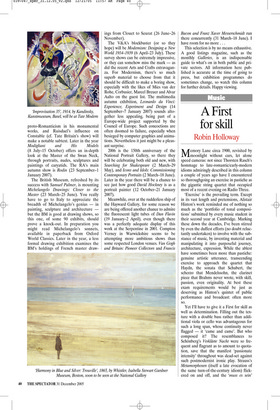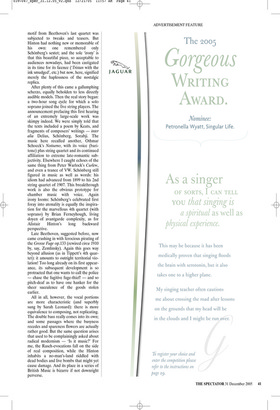A First for skill
Robin Holloway
Memory Lane circa 1900, revisited by moonlight without cars, let alone speed cameras: not since Thorsten Rasch’s hommage to late-romantic/early-modern idioms admiringly described in this column a couple of years ago have I encountered so thoroughgoing an exercise in pastiche as the gigantic string quartet that occupied most of a recent evening on Radio Three.
‘Exercise’ is the prevailing term. Except in its vast length and pretensions, Alistair Hinton’s work reminded me of nothing so much as the ‘portfolio of tonal compositions’ submitted by every music student in their second year at Cambridge. Marking these down the decades, I’ve been stirred by even the duffest efforts (no doubt reluctantly undertaken) to involve with the substance of music, by inventing material and manipulating it into purposeful journey, architecture, expression. While the ablest have sometimes been more than pastiche: genuine artistic utterance, transcending exercise to approach the quartet that Haydn, the sonata that Schubert, the scherzo that Mendelssohn, the clarinet piece that Brahms never wrote, with skill, passion, even originality. At best these exam requirements would be just as deserving as Hinton’s quintet of public performance and broadcast: often more so.
Yet I’ll have to give it a First for skill as well as determination. Filling out the texture with a double bass rather than additional viola or cello was advantageous for such a long span, whose continuity never flagged — it ‘came and came’. But who composed it? The resemblances to Schönberg’s Verklärte Nacht were so frequent and flagrant as to amount to quotation, save that the manifest ‘passionate intensity’ throughout was dead-set against such postmodernist ironic play. Strauss’s Metamorphosen (itself a late evocation of the same turn-of-the-century idiom) flickered on and off, and the ‘muss es sein’ motif from Beethoven’s last quartet was subjected to tweaks and teasers. But Hinton had nothing new or memorable of his own: one remembered only Schönberg’s sextet; and the sole ‘irony’ is that this beautiful piece, so acceptable to audiences nowadays, had been castigated in its time for its licence (‘Tristan with the ink smudged’, etc.) but now, here, signified merely the haplessness of the nostalgic replica.
After plenty of this came a gallumphing scherzo, equally beholden to less directly audible models. Then the real story began: a two-hour song cycle for which a solo soprano joined the five string players. The announcement prefacing this first hearing of an extremely large-scale work was skimpy indeed. We were simply told that the texts included a poem by Keats, and fragments of composers’ writings — inter alia Delius, Schönberg, Sorabji. The music here recalled another, Othmar Schoeck’s Notturno, with its voice (baritone) plus string quartet and its continued affiliation to extreme late-romantic subjectivity. Elsewhere I caught echoes of the same thing from Peter Warlock’s Curlew, and even a trance of VW. Schönberg still figured in music as well as words: his idiom had advanced from 1899 to his 2nd string quartet of 1907. This breakthrough work is also the obvious prototype for chamber music with voice. Again irony looms: Schönberg’s celebrated first foray into atonality is equally the inspiration for the marvellous 4th quartet (with soprano) by Brian Ferneyhough, living doyen of avantgarde complexity, as for Alistair Hinton’s long backward perspective.
Late Beethoven, suggested before, now came crashing in with ferocious pirating of the Grosse Fuge op.133 (rewired circa 1910 by, say, Zemlinsky). Again this goes way beyond allusion (as in Tippett’s 4th quartet): it amounts to outright territorial violation! Too long already on its first appearance, its subsequent development is so protracted that one wants to call the police — chase the fugitive fuge-thief! — and so pitch-deaf as to have one hanker for the sheer succulence of the goods stolen earlier.
All in all, however, the vocal portions are more characteristic (and superbly sung by Sarah Leonard): there is more equivalence to composing, not replicating. The double bass really comes into its own; and some passages where the busyness recedes and spareness flowers are actually rather good. But the same question arises that used to be complainingly asked about radical modernism — ‘Is it music?’ For me, the Rasch-evocations fall on the side of real composition, while the Hinton inhabits a no-man’s-land riddled with dead bodies and live bombs that might yet cause damage. And its place in a series of British Music is bizarre if not downright perverse.


















































 Previous page
Previous page